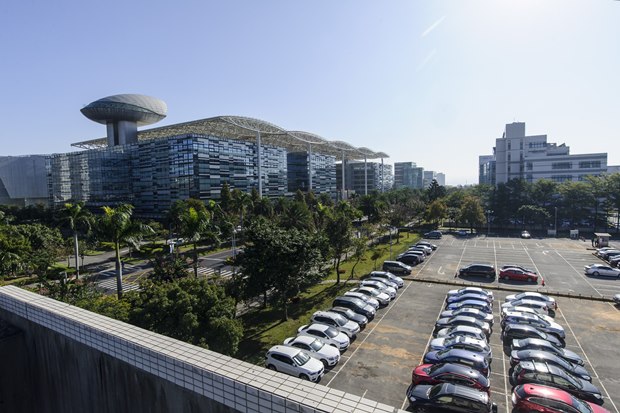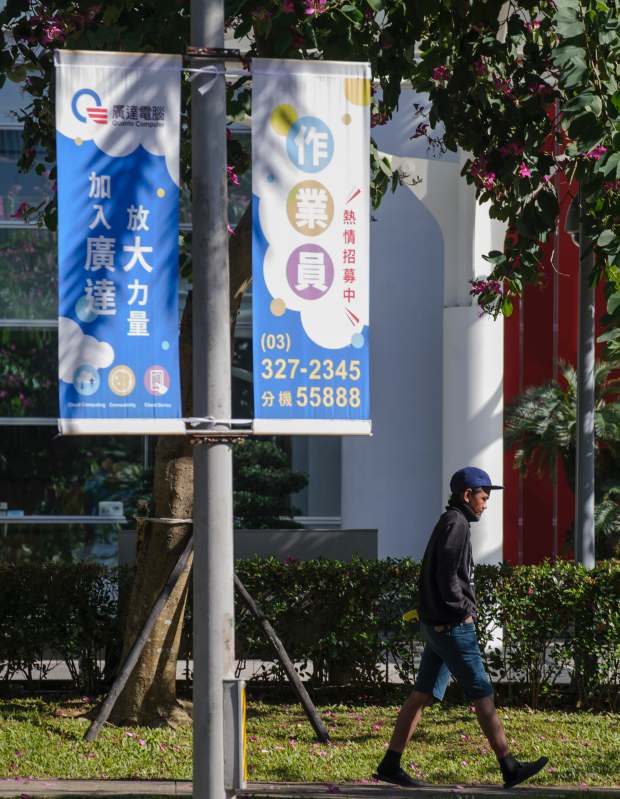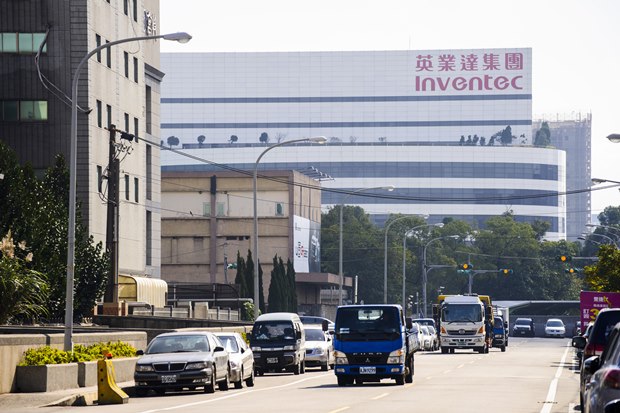Returning to Summit of Server Industry Kingdom
Taiwan, Unexpected Beneficiary of US-China Trade War

Source:CW
In the midst of the U.S.-China trade war, Taiwan’s electronic industry has seen the largest wave of repatriation in its history. The server industry has re-established its base in the Greater Taoyuan-Hsinchu region, and Taiwan’s data security and technological knowhow have become critical in this “new technology Cold War.” What sort of impact will this mass relocation of the computer industry have on Taiwan’s economy? And does it signal Made in Taiwan’s return to glory?
Views
Taiwan, Unexpected Beneficiary of US-China Trade War
By Elaine Huang, Liang-rong Chenweb only
The exodus of the notebook computer sector was probably the most dramatic event in the history of the Taiwanese high-tech industry.
Taiwan’s government first permitted local notebook computer makers to set up manufacturing in China in 2001. Within just a few short years, this flagship industry, worth over NT$100 billion in production value and tens of thousands of jobs, had made a clean exit from Taiwan.
Yet what goes around often comes around, and after more than a decade, the winds of the trade rift between the United States and China have once again blown the cutting-edge computer manufacturing industry back to Taiwan.
Remarkably, the rapidity and force of this tide are no less potent than the one that swept away the notebook industry all those years ago.
History’s Biggest, Most Frenzied Homecoming
A gray, five-story plant building across from Quanta corporate headquarters in Linkou is a witness to the changing fortunes across the computer industry.

When the Quanta Linkou plant let go 800 manufacturing personnel in April of 2005, it was the last of the Taiwanese notebook computer manufacturing plants to shut down operations.
Since then, optical drives and smart phones have been produced on the premises. And today, it is poised to become a component of Taiwan’s most important Cloud server production center.
The fourth floor of the plant was formerly occupied by the 200-plus team of Techman Robot, a Quanta-invested startup, and a robotic arm assembly line.
However, the Techman team recently packed frantically through the night, vacating the 3,300-plus square meter space to accommodate a mystery operation in dire need.
“We were informed in November that we had to finish moving within two weeks, so that all office space could become production lines,” relates a frustrated Techman executive. “The banging and clattering started before we even finished moving,” he says.
Quanta would not confirm the identity of the “mystery operation” slated to occupy the newly vacated space. However, corporate communications did relate that, in addition to servers, newly invested production capacity will also go towards products with high added value, high unit price, and a high degree of automation. Still, notebook computer insiders and analysts contacted by CommonWealth asserted that only the server sector - which falls under the third wave of the U.S. “Special 301” tariffs - has such a strong demand at this time. Accordingly, effective from last September 24, exports from China to the U.S. are subject to a 10-percent tariff, which could be hiked to as much as 25 percent sometime in 2019.
“Quanta has relocated two (server production) lines back to Taiwan,” says a server industry executive who wishes to remain anonymous. Not only that, it will also produce Quanta’s current “golden egg” - high-end Cloud servers - for Cloud service customers including Amazon and Google.
To be more specific, the production that was moved back to Taiwan is what is known in the industry as “Level 6 servers” - actually motherboards - which, following highly automated production, are shipped to small assembly facilities inside the U.S. or along the U.S.-Mexican border to be installed in server racks.
Quanta produces over three million servers each year, nearly all of which are delivered to U.S. customers. This has left only a small proportion of server production in China to accommodate Chinese domestic customers. (Read: China’s IC Ambitions, Big Money ≠ A Second TSMC)
Monthly production capacity of 4,000 servers has been relocated from the Songjiang plant in China to Taiwan, accounting for about one-seventh of Quanta’s total production capacity. However, “this is just the first step, with decisions on whether to continue expansion to be determined as the situation progresses,” says an executive under the Quanta Group.
Simultaneous Plant Expansion, Recruitment
Quanta founder and CEO Barry Lam, always vigilant about the future, made the decision to concentrate the future Taiwanese server production base close to Quanta’s corporate headquarters.
In November, Quanta announced investment of NT$4.28 billion toward the purchase of a 36,300 square-meter lot and 29,700 square meters of buildings located in the Hwa Ya Technology Park in Linkou. This is believed to comprise plant facilities formerly belonging to optical storage manufacturer CMC and its subsidiary, Sun Well Solar, located just a block away from Quanta corporate headquarters.
“As soon as Sun Well’s (idle) machines were cleared out, Quanta’s machines came right in,” revealed a staff member tasked with handling arrangements of Sun Well’s plant facilities. According to the source, Quanta executives wanted installation of the production machinery to be completed within three months, an ambitious timetable. “I’m pretty sure the machines were shipped over from China,” added the Sun Well staffer.
Not only existing plant facilities, but an approximately 10,000 square-meter vacant lot temporarily being used as a Quanta Group parking lot right across from Quanta headquarters on the opposite side of Sun Well is slated to be developed into a new production plant. And designs for the new facility have already been drafted.
Personnel recruitment is also being conducted as production lines are hurriedly being expanded.
A long row of banners emblazoned with “Expand your strength, join Quanta,” and “Production line staff wanted” line the street across from Quanta headquarters. Similar recruitment advertisements can be seen around the Taoyuan area on the sides of public buses.

Banners emblazoned with “Expand your strength, join Quanta,” and “Production line staff wanted.”(Source: Ming-tang Huang)
“Interview? Straight ahead,” says a security guard at the manufacturing plant across the street from Quanta company headquarters, presuming that our CommonWealth reporter had come for a job interview. All day long, candidates interview for jobs in a conference room at the far end of the area with a sign outside reading “Quanta Computer Interviews.”
When our reporter called the job recruitment hotline, as soon as the call connected a person on the other end said, “Never mind anything else. Are you available to start work on January seventh?”
How Can Servers Return to Taiwan?
If all the servers and data center equipment destined for the U.S. market were to be moved over from China, just what sort of volume would be involved? And how large an impact would it have on Taiwan’s economy?
According to statistics from DRAMeXchange, approximately 12 million servers are produced each year worldwide, of which the United States accounts for 40 percent.
In other words, nearly five million servers are exported to the U.S. each year, and production of servers closely connected to global data security is set to be steadily evacuated from China to manufacturing facilities in Taiwan, Southeast Asia, and Mexico.
In spite of a 90-day “ceasefire” agreement between Xi Jinping and Donald Trump at their early December summit, the tide of manufacturing relocation shows no signs of abating.
Around 70 percent of the global production volume of motherboards, which account for a considerable portion of the cost of servers and computer products, is sent to the United States. If only 30 percent of that volume were brought back to Taiwan, it would be a huge shot in the arm to the Taiwanese economy. The impact would be significant enough to turn the bleak forecast for Taiwan’s economic growth around, possibly reaching three percent.
Still, no matter how it is reckoned, production costs are invariably higher in Taiwan than across the strait in China, let alone issues manufacturers frequently complain about, like labor and land shortages. So how then can server production lines withstand the economic pressure and make the move back to Taiwan?
In addition to a 10-percent import tariff, which could potentially go as high as 25 percent, a major guiding force is the high tech Cold War intensifying between the U.S. and China.
Leading Chinese tech company Huawei encountered resistance just as it was moving to expand its 5G operations, as both sides of the aisle in the U.S., along with other countries including Germany and Japan, expressed concerns over the security of the company’s hardware.
In early November of 2018, Bloomberg Businessweek ran a cover story describing how the Chinese government is suspected of embedding tiny spy chips in servers produced in China for Apple and Amazon, causing a major uproar. (Read: The Price of Convenience?)
Although Apple and other media subsequently called into question the veracity of the report, figures across the U.S. political spectrum have become increasingly distrustful of sensitive high-tech data transmission products manufactured in China. And this suspicion has become an untellable secret for Big Tech names like Google and Amazon.
“Made in Taiwan” is staging a glorious comeback.
From semiconductor chips, to IC packaging and testing, to circuit boards, assembly, and production, the upstream and downstream industry cluster remains in Taiwan, not only delivering high efficiency, but also eliminating the risk of being compromised by Chinese hackers within the supply chain.
“Relocating back to Taiwan is quite simple. Because the supply chain still existed in Taiwan, but relocating requires around 10 to 12-percent higher cost,” offers a senior computer industry executive.
“MIT” Customers Willing to Pay More
“Although the cost is a little higher after bringing manufacturing back to Taiwan, customers are willing to pay more,” asserted Barry Lam during a Quanta institutional investors’ conference.
The question in people’s minds is, just how much more are those U.S.-based Big Tech brands willing to pay to safeguard the manufacturing pedigree under the data security structure? In another respect, this is the premium they are willing to pay for “Made in Taiwan.” (Read: Snatching Apple Orders, TSMC’s Unsung Weapon)
“In Amazon’s case (given the worst case scenario of a 25-percent tariff on server components made in China), they’re willing to spend an extra nine to 13 percent,” offers the general manager of a major server rack cooling equipment maker from his office in a New Taipei server industry park.
Apart from motherboards, cooling systems are the most critical components inside server racks. Amazon specifically requires that the above-mentioned vendor ship products directly to the United States following production in Taiwan. (Read: Apple’s ‘Face ID’ Made in Taiwan)
The general manager relates that Amazon had to agree to pay a premium before he would move orders back to Taiwan from PRC production facilities.
Two Other Major Electronics Manufacturers Set Up in Taoyuan
In addition to Quanta, another major server manufacturer, Inventec, has quietly flown under the radar and transferred orders back to Taiwan for production at its Taoyuan plant.
Located around 20 minutes by car from Quanta’s headquarters in the Hwa Ya Technology Park on Dazhi Road in the Guishan Industrial Zone, Inventec’s building, emblazoned with the company’s red logo, stands proudly over a lush green lawn.

In 2015, Delta Electronics sold this plant, its largest, to Inventec for NT$6.6 billion. The building, the purchase of which had been personally decided by Inventec founder Yeh Kuo-yi, is regarded as the headquarters of a planned corporate computer division, allowing the company to move server operations scattered in Daxi and Pingzhen to this facility.
With the outbreak of the U.S.-China trade war, creating the urgent need to evacuate server manufacturing designated for export to the U.S. from China, Inventec, long an OEM manufacturer of HP server products, took the step to make the building its main operations base.
“Inventec switched manufacturing of U.S.-bound servers to Taiwan from the middle of 2018,” reveals an Inventec staffer. Inventec manufactures around half of its annual production volume of three million servers for HP. And with the exception of European assembly in the Czech Republic, nearly all SMT (Surface Mount Technology) lines have been relocated back to the company’s Guishan plant.
Compal: Ready to Expand Production in Pingzhen to Meet Demand
Compal Electronics’ plant is also located in Taoyuan County, along Nandong Road in Pingzhen, about a 20-minute drive from Inventec’s Guishan facility.
Anticipating the likely fallout from the next wave of tariffs on notebooks, notebook computer mainstay Compal Electronics quietly took proactive measures in preparation to expand production capacity at its Pingzhen plant.
“They were interviewing production line staff last month (November),” related the concierge of a building across from Compal’s Pingzhen facility.
One Compal employee shared that the company’s Pingzhen facility had already nearly reached maximum production capacity, due to its production line making industrial computers for U.S. export. “The boss was afraid that if the tables turned in the trade war and we were caught unprepared, the company would be in serious trouble. So plans are in the works to convert all the parking lots on the plant premises to more space for production lines.”
During the company’s institutional investor conference last November, Compal Company Vice Chairman and CSO, Ray Chen, stated: “We will keep in close contact with our customers, and if necessary, we are prepared to activate plants overseas and in Taiwan for production.”
“No matter what happens with the trade war, the supply chain will still keep moving, so it’s just a question of how much manufacturing capacity is moved. The key is to spread the risk,” offers a senior executive at an electronics contract manufacturer. Private consensus within the high tech community is that, thanks to the unpredictability of U.S. President Trump’s hawkish moves, spreading out production capacity and deploying manufacturing around the globe is now standard policy.
Translated by David Toman
Edited by Sharon Tseng








